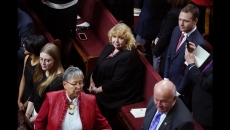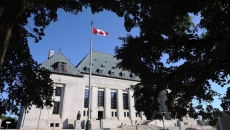A federal prosecutor says the disclosure of evidence to defence lawyers has "slowed significantly" in the case of Cameron Jay Ortis, an RCMP member charged with revealing secrets.
Crown lawyer John MacFarlane said during a brief Ontario Superior Court hearing Monday the pace of disclosure had dropped off due to the COVID-19 pandemic, which has wreaked havoc with court cases and schedules.
Ortis is accused of Security of Information Act violations, breach of trust and a computer-related offence.
The director general of the RCMP's national intelligence co-ordination centre was arrested Sept. 12 for allegedly revealing secrets to an unnamed recipient and planning to give additional classified information to an unspecified foreign entity.
MacFarlane said that despite the pandemic he had been in "regular contact" with Ortis' lawyer, Ian Carter.
Justice Robert Maranger agreed to adjourn the case until Sept. 4.
"We hope to be in a position to provide Mr. Carter with some disclosure between now and then," MacFarlane told the court.
Ortis, who is being held at an Ottawa jail, took part in the virtual video hearing Monday via telephone link.
Maranger said "these are strange, difficult times," noting that video hearings are not his preferred way of conducting business.
"I like being in a courtroom, like I know most of you do," the judge said.
The ongoing COVID-19 crisis and the need for physical distancing will require creativity in coming months, including prioritizing cases at Ottawa's courthouse and ongoing reliance on video hearings where possible, Maranger said.
"No one likes this, but on the other hand we can't very well take risks where we're going to make a bunch of people sick, where we're going to spread a disease that we don't want to spread."
Ortis' next court appearance will come almost a year after he was taken into custody.
RCMP Commissioner Brenda Lucki said last year the allegations against Ortis are unsettling, noting he had access to information from domestic and international allies.
Lucki told a September news conference that investigators came across documents during a joint investigation with the U.S. Federal Bureau of Investigation that led the Mounties to believe there could be some kind of "internal corruption."






